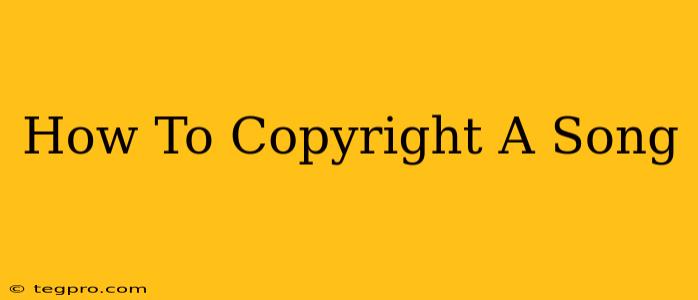Creating music is a deeply personal and often painstaking process. Once you've poured your heart and soul into crafting a song, protecting your intellectual property is paramount. Knowing how to copyright a song is crucial for any serious musician, regardless of your level of experience. This comprehensive guide will walk you through the process, ensuring your original compositions are safeguarded.
Understanding Copyright and Your Musical Works
Before diving into the specifics of registration, let's clarify what copyright protects and what it entails. Copyright automatically protects your original musical works the moment they are fixed in a tangible medium of expression, such as a recording or sheet music. This means that from the instant you write down your melody, lyrics, or record your song, it's technically copyrighted. However, registering your copyright with the U.S. Copyright Office provides several significant advantages.
What Copyright Protects in a Song:
- Musical Composition: This includes the melody, harmony, rhythm, and overall structure of your song.
- Lyrics: The words and poetic content of your song are also protected under copyright.
- Sound Recording: This refers to the actual audio recording of your song performance. Note that the composition and the sound recording are separately copyrightable.
The Benefits of Registering Your Copyright:
While automatic copyright exists, formal registration offers substantial benefits:
- Legal Proof of Ownership: Registration provides legal documentation proving you are the owner of the copyright. This is invaluable in case of infringement.
- Ability to Sue for Infringement: Registered copyrights allow you to pursue legal action against anyone who infringes on your work, recovering damages and potentially attorney's fees.
- International Protection: Registration with the U.S. Copyright Office can facilitate international copyright protection under certain treaties.
- Increased Credibility: Registered copyrights lend credibility to your work and can attract potential collaborators, publishers, or licensing opportunities.
How to Register Your Copyright:
The process of registering your song's copyright with the U.S. Copyright Office is relatively straightforward, primarily done online these days. Here's a step-by-step guide:
- Gather Your Materials: You'll need a clean copy of your musical composition (sheet music or a lead sheet is ideal) and, if applicable, your sound recording.
- Complete the eCO Application: The online application is user-friendly and guides you through the necessary fields. Be sure to accurately describe your work and provide the necessary information.
- Pay the Filing Fee: There is a fee associated with registering your copyright. The amount varies depending on the type of work you're registering.
- Submit Your Application: Once you've completed the application and paid the fee, submit your application electronically. You will receive a confirmation number.
- Receive Your Certificate: After processing, you'll receive a certificate of registration from the U.S. Copyright Office. This serves as official proof of your copyright.
Protecting Your Song Beyond Copyright Registration:
Copyright registration is a crucial step, but it's not the only way to protect your music. Consider these additional measures:
- Documentation: Keep detailed records of your songwriting process, including dates, drafts, and any witnesses to your creative work.
- Sound Recordings: Register your sound recordings separately from your musical composition.
- Watermarking: Add subtle watermarks to your digital audio files.
- Legal Counsel: For complex situations or significant infringements, consulting with a lawyer specializing in intellectual property law is highly recommended.
In Conclusion:
Understanding how to copyright a song is a vital aspect of safeguarding your creative investment. By registering your copyright, you significantly enhance your ability to protect your work and leverage your musical creations effectively. Taking proactive steps to protect your intellectual property is crucial for any aspiring or established musician. Remember that while this guide offers valuable information, it is not a substitute for legal advice. Always consult a legal professional for advice tailored to your specific circumstances.

